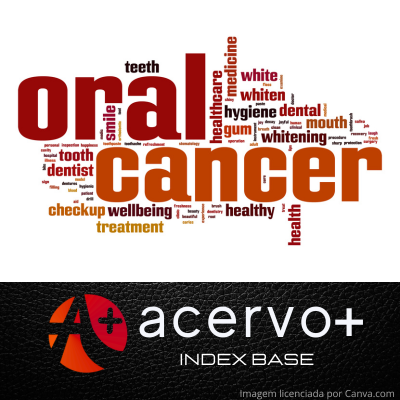Metilação do gene PTEN no câncer oral
##plugins.themes.bootstrap3.article.main##
Resumo
Objetivo: Investigar a evidência atual referente à associação da metilação do gene PTEN com o câncer oral e determinar a frequência desse evento epigenético. Métodos: Realizou-se uma revisão sistemática, cujas buscas foram realizadas no PubMed, Embase, Web of Science, Scopus e Livivo. Também foram realizadas buscas na literatura cinzenta, incluindo Google Scholar e BDTD. Resultados: Foram identificados 592 estudos. Contudo, apenas 5 estudos satisfizeram os critérios de elegibilidade. As pesquisas foram publicadas entre 2005 e 2015, incluindo 717 casos de câncer oral. A meta-análise apontou uma associação com significância estatística entre metilação do gene PTEN e câncer oral (OR = 60,39; p < 0,01). Adicionalmente, observou-se que apenas 7,85% dos casos apresentavam o gene PTEN metilado. Contudo, a certeza da evidência foi classificada como muito baixa. Conclusão: A metilação de PTEN está associada ao câncer oral, embora sua frequência nesse tipo de câncer seja baixa. Esses achados apresentaram certeza da evidência muito baixa, destacando a necessidade de mais pesquisas sobre o papel da metilação de PTEN no câncer oral.
##plugins.themes.bootstrap3.article.details##
Copyright © | Todos os direitos reservados.
A revista detém os direitos autorais exclusivos de publicação deste artigo nos termos da lei 9610/98.
Reprodução parcial
É livre o uso de partes do texto, figuras e questionário do artigo, sendo obrigatória a citação dos autores e revista.
Reprodução total
É expressamente proibida, devendo ser autorizada pela revista.
Referências
2. CHAVES FN, et al. Loss of heterozygosity and immunoexpression of PTEN in oral epithelial dysplasia and squamous cell carcinoma. Experimental and Molecular Pathology, 2020; 112: 104341.
3. DA COSTA AABA, et al. Low PTEN expression is associated with worse overall survival in head and neck squamous cell carcinoma patients treated with chemotherapy and cetuximab. Int J Clin Oncol, 2015; 20(2): 282–9.
4. GOEL A, et al. Frequent inactivation of PTEN by promoter hypermethylation in microsatellite instability-high sporadic colorectal cancers. Cancer Res, 2004; 64(9): 3014–21.
5. GONZÁLEZ-MOLES MÁ, et al. Challenges in the Early Diagnosis of Oral Cancer, Evidence Gaps and Strategies for Improvement: A Scoping Review of Systematic Reviews. Cancers (Basel), 2022; 14(19): 4967.
6. GUYATT G, et al. GRADE guidelines: 1. Introduction—GRADE evidence profiles and summary of findings tables. Journal of Clinical Epidemiology, 2011; 64(4): 383–94.
7. HUANG KH, et al. Methylation of RASSF1A, RASSF2A, and HIN-1 Is Associated with Poor Outcome after Radiotherapy, but not Surgery, in Oral Squamous Cell Carcinoma. Clinical Cancer Research, 2009; 15(12): 4174–80.
8. HUQ MS, et al. Cancer care and outreach in South Asian Association for Regional Cooperation (SAARC) countries: from epidemiology and the National Cancer Control Programme to screening, diagnosis, and treatment. The Lancet Oncology, 2024; 25(12): 639–49.
9. IIZUMI S, et al. MicroRNA 142-5p promotes tumor growth in oral squamous cell carcinoma via the PI3K/AKT pathway by regulating PTEN. Heliyon, 2021; 7(10): 8086.
10. ISHIDA E, et al. Promotor hypermethylation of p14ARF is a key alteration for progression of oral squamous cell carcinoma. Oral Oncology, 2005; 41(6): 614–22.
11. KISHI M, et al. Genetic and epigenetic alteration profiles for multiple genes in salivary gland carcinomas. Oral Oncology, 2005; 41(2): 161–9.
12. LIM HJ, et al. Current clinical regulation of PI3K/PTEN/Akt/mTOR signalling in treatment of human cancer. J Cancer Res Clin Oncol, 2015; 141(4) :671–89.
13. LUO S, et al. The association of PTEN hypermethylation and breast cancer: a meta-analysis. Onco Targets Ther, 2016; 9: 5643–50.
14. MARQUES AEM, et al. Expression profile of the PI3K-AKT-mTOR pathway in head and neck squamous cell carcinoma: Data from Brazilian population. Oral Surgery, Oral Medicine, Oral Pathology and Oral Radiology, 2022; 133(4): 453–61.
15. MOURA ACD, et al. Worldwide prevalence of PI3K-AKT-mTOR pathway mutations in head and neck cancer: A systematic review and meta-analysis. Critical Reviews in Oncology/Hematology, 2021; 160: 103284.
16. MUNN Z, et al. Methodological guidance for systematic reviews of observational epidemiological studies reporting prevalence and cumulative incidence data. Int J Evid Based Healthc, 2015; 13(3): 147–53.
17. MURAO K, et al. Epigenetic abnormalities in cutaneous squamous cell carcinomas: frequent inactivation of the RB1/p16 and p53 pathways. Br J Dermatol, 2006; 155(5): 999–1005.
18. OLIVEIRA JMD, et al. Prevalence of orofacial injuries in wheeled non‐motor sports athletes: A systematic review and meta‐analysis. Dental Traumatology, 2021; 37(4): 546–56.
19. OUZZANI M, et al. Rayyan—a web and mobile app for systematic reviews. Syst Rev, 2016; 5(1): 210.
20. PAGE MJ, et al. The PRISMA 2020 statement: an updated guideline for reporting systematic reviews. BMJ, 2021: 71.
21. PAPANIKOLAOU V, et al. PTEN Deregulation Mechanisms in Salivary Gland Carcinomas. Cancer Diagn Progn, 2024; 4(1): 25–9.
22. PENG H, et al. Higher methylation intensity induced by EBV LMP1 via NF-κB/DNMT3b signaling contributes to silencing of PTEN gene. Oncotarget, 2016; 7(26): 40025–37.
23. SADEQ V, et al. Association of sporadic breast cancer with PTEN/MMAC1/TEP1 promoter hypermethylation. Med Oncol, 2011; 28(2): 420–3.
24. SHEIKHOLESLAMI S, et al. Promoter Methylation of Tumor Suppressors in Thyroid Carcinoma: A Systematic Review. Iran J Public Health, 2021; 50(12): 2461–72.
25. STARZYŃSKA A, et al. Prognostic value of the PIK3CA, AKT, and PTEN mutations in oral squamous cell carcinoma: literature review. Arch Med Sci, 2021; 17(1): 207–17.
26. SUSHMA PS, et al. PTEN and p16 genes as epigenetic biomarkers in oral squamous cell carcinoma (OSCC): a study on south Indian population. Tumor Biol, 2016; 37(6): 7625–32.
27. TARLE M e LUKŠIĆ I. Pathogenesis and Therapy of Oral Carcinogenesis. Int J Mol Sci, 2024; 25(12): 6343.
28. TRUJANO-CAMACHO S, et al. HOTAIR Promotes the Hyperactivation of PI3K/Akt and Wnt/β-Catenin Signaling Pathways via PTEN Hypermethylation in Cervical Cancer. Cells, 2024; 13(17): 1484.
29. ZHAO J, et al. Loss of PTEN Expression Is Associated With High MicroRNA 24 Level and Poor Prognosis in Patients With Tongue Squamous Cell Carcinoma. Journal of Oral and Maxillofacial Surgery, 2017; 75(7): 1449.

